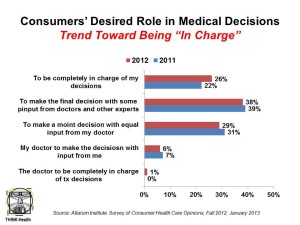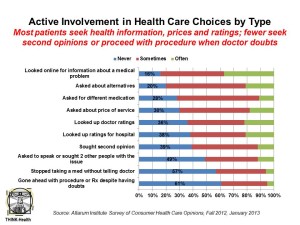
U.S. consumers’ desire to take an active role in their health decisions is growing, according to the Altarum Institute Survey of Consumer Health Care Opinions.
61% of people want to make health decisions either on their own (26%) or with input from their doctor (38%). The proportion of people wanting to be “completely in charge of my decisions” rose 4 percentage points in one year, from 2011. This statistic skews younger, with 33% of people 25-34 and 31% of those 35-44 wanting to be “completely in charge.” Only 17% of those 55-64 felt like being totally in charge of their health care decisions.
The moniker “health care consumer” can also involve shopping for health care by price. Nearly one-half of consumers have asked about the price of health care, and 65% of those who have asked about prices said they were “very confident” in being able to lower their prices by shopping around for health care.
The most popular source of information used to select a doctor was opinions from family and friends, at 82%, followed by online ratings about doctors’ “bedside manner” or waiting time (28%), online ratings from experts on clinical quality (24%), information comparing cost (18%), and ads in mass media (10%).
Only about one-half of consumers (47%) are confident that they’ll be able to find a qualified doctor by comparing results from an online source.
66% of consumers believe their doctor keeps all of their medical information on a computer, with 24% saying they don’t know. One-third of people claim that they can look up almost anything (such as test results) about their health history on their computer.
 The second chart details the types of behaviors in which consumers are health-engaged. Most common are looking online for health information, asking about alternatives and prices for services, looking up ratings for providers, and asking for different medications.
The second chart details the types of behaviors in which consumers are health-engaged. Most common are looking online for health information, asking about alternatives and prices for services, looking up ratings for providers, and asking for different medications.
Privacy continues to be a concern for consumers polled in the Altarum survey, but not a majority are worried: roughly equal proportions worry about privacy of their personal health information, compared with those neutral on the subject or unconcerned. This opinion was even across age, health status, and income cohorts.
Altarum surveyed 2,004 online participants 25-64 years of age in November 2012.
Health Populi’s Hot Points: The top-line finding of the Altarum survey is that younger adults 25-34 embrace a more active role in decision making than older adults. However, some of this is due to the fact that younger people have had more experience in consumer-directed health plans than older people. Younger people have also had more experience seeking health information, looking at ratings sites for providers, and questioning physicians’ choices for medications and treatments.
There is an interesting conundrum in this survey when it comes to seeking cost information: people enrolled in high-deductible health plans did not report using cost information online more frequently than people in other types of health plans. But these people were more keen to seek online information on bedside manner and quality.
There is another data artifact that stands out: that two-thirds of consumers said their doctor keeps “all” of their medical information on a computer. Furthermore, 30% said they could look up “almost anything” about their health history on their computer.
Who are these people? While I often think I’m the shoemaker’s child with no shoes when it comes to personal health IT because my provider uses a big-iron HIT vendor’s EHR with a pretty lame patient portal (that has a couple of odd errors in my health plan’s personal health record – no, I’ve never had a disorder of pancreatic secretion), and I don’t have access to the wonders of the Kaiser Permanente My Health Manager or the VA’s MyHealtheVet. Nor do most health citizens in America. So it’s fascinating that two-thirds of patients see computers in their doctors’ offices and believe they can view their entire health history there — great news for Blue Button if it’s true!
Thanks to Altarum for updating the range of health engagement activities that U.S. health consumers do. The firm’s consumer survey will continue and we’ll track the trends here on Health Populi.




 I'm in amazing company here with other #digitalhealth innovators, thinkers and doers. Thank you to Cristian Cortez Fernandez and Zallud for this recognition; I'm grateful.
I'm in amazing company here with other #digitalhealth innovators, thinkers and doers. Thank you to Cristian Cortez Fernandez and Zallud for this recognition; I'm grateful. Jane was named as a member of the AHIP 2024 Advisory Board, joining some valued colleagues to prepare for the challenges and opportunities facing health plans, systems, and other industry stakeholders.
Jane was named as a member of the AHIP 2024 Advisory Board, joining some valued colleagues to prepare for the challenges and opportunities facing health plans, systems, and other industry stakeholders.  Join Jane at AHIP's annual meeting in Las Vegas: I'll be speaking, moderating a panel, and providing thought leadership on health consumers and bolstering equity, empowerment, and self-care.
Join Jane at AHIP's annual meeting in Las Vegas: I'll be speaking, moderating a panel, and providing thought leadership on health consumers and bolstering equity, empowerment, and self-care.